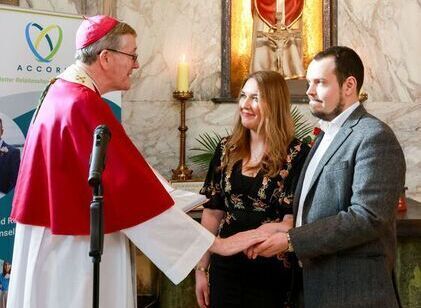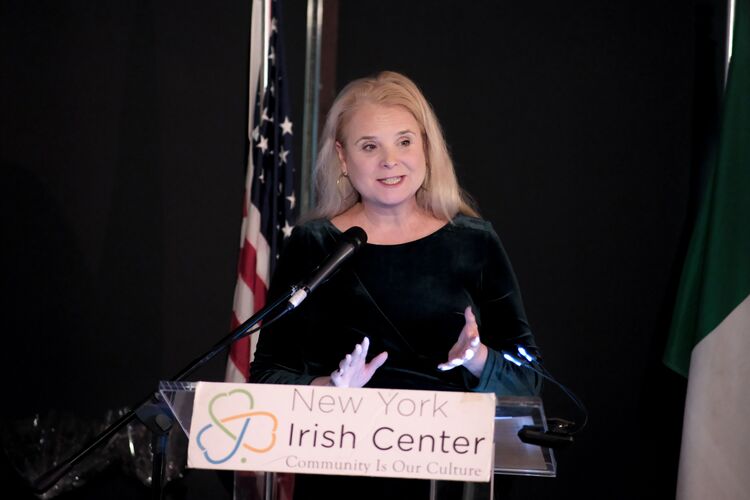Dr. Rozalyn Anderson directs the Metabolism of Aging Research Program at the University of Wisconsin-Madison and is biological sciences co-editor-in-chief of the Journals of Gerontology.
By Peter McDermott
Dr. Rozalyn Anderson doesn’t like being told what to do. And she doesn’t tell other people how to live their lives, either.
She offered an explanation for her attitude: “I’m Irish.”
Still, Anderson, who leads the Metabolism of Aging Research Program at the University of Wisconsin-Madison, is always happy to share the latest news about the benefits of caloric restriction.
The Dalkey, Co. Dublin, native is also biological sciences co-editor-in-chief of the Journals of Gerontology, which a little over a year ago published a special issue entitled: “Caloric Restriction and Restrictive Diets: Interventions that Target the Biology of Aging.”
“Ultimately what these studies show is that what you eat influences how you age,” Anderson said at the time.
The Gerontological Society of America, the publisher via the Oxford University Press, said: “Beneficial longevity effect of a simple reduction in calorie intake was first established in rodent studies more than 80 years ago.”
During her American career, which began with a post-doctoral degree at Harvard Medical School, Anderson moved from yeast, to mice and then to monkeys. It has become increasingly clear, however, that the science is translatable to human health and human aging.
Interviewed in November at the GSA Annual Scientific Meeting in Boston in November, the Irish scientist put the apparent reason for this in the simplest terms. “It's energy and fuel. Instead of using energy for growth processes, the energy is used for surveillance and repair and regeneration. It's like budget – where's your money flow and what are you spending it on.”
The GSA said that “scientists have made considerable progress in identifying cellular and systemic processes that likely contribute to the increase in disease vulnerability that is associated with aging.”
Anderson said: “We have a paradigm. It already works; now how is it working? If we can figure out what it’s doing, it’s directly relevant to human aging and human health.”
Dr. Luigi Fontana, who emphasizes diet and nutrition research rather than drug discovery in his work, told Anderson in an Oxford University Press blog Q&A in December, “It’s really amazing. We are now seeing people from the Caloric Restriction Society reach their 70s and 80s in robust health. Many of them at this age are active, prescription free, and still without complications of age-associated diseases and disorders. The diet is really delivering on the promise of healthy aging.”
Fontana continued: “At this stage, we are looking for alternate ways to enhance health. For example, it is possible to choose a diet that promotes health such as the Mediterranean Diet without actually doing full-blown caloric restriction.”
'Aging is malleable'
The problem, though, with a scientist making any kind of recommendation with regard to diet is twofold: lack of enthusiasm from the many and over-enthusiasm from the few, those in Anderson’s words who might “go bananas with it.”
She said, “Nutritionists are blue in the face making recommendations.
“In the United States, two-thirds of the population is either overweight or obese. There are profound health consequences to that. I don’t think most people would be able to take on the level of discipline required to do a caloric restricted diet.
“They already know,” she said of the public’s awareness. “What they choose to do flies in the face of what they know in terms of health. People will do what suits them in their lives."
On the other hand, she added, “There’s no way you’d take on such a diet without medical supervision, especially if you’re a person who’s overweight. This isn’t stuff you can mess around with.”
“But people do it [with medical supervision] and they enjoy doing it,” Anderson said.
A CR diet without malnutrition — “without malnutrition is the key” — leads to people having more energy, improved sleeping patterns and excellent health indices overall. “Their cardiovascular profile is a thing of beauty,” said the scientist.
People who exercise and are very fit also have good indices of health, but that hasn’t in itself been shown to extend lifespan. Anderson, who cycles to and from work, pointed to a study by the Pennington Biomedical Research Center in Baton Rouge that has a done a comparative study with one group of subjects combining exercise with some caloric reduction, a second group doing just caloric reduction and a third doing neither.
“CR does something different,” Anderson said, “aging is inevitable, but how you age is malleable. That's the key finding in the last 10 years.”
Individual variation
Exercise and physical activity are part of the equation, nonetheless. Fontana, who recently moved from the Washington University School of Medicine to the University of Sydney, said in his discussion with Anderson that “in times gone by individuals on this kind of [Mediterranean] diet had an active lifestyle with physically demanding tasks being a routine day to day occurrence. The amount of food eaten must be matched to energy demands on the body, especially with the modern sedentary lifestyle, otherwise, the benefits may not be as strong.”
Anderson stressed that there's a lot of room for the individual: “One of the things that’s clear when you're working with larger species, like people and monkeys, is that their individual variation is huge
”We all know this. Someone in the family,” she told the Echo, “they can sit down and eat four slices of cake and no problem. They don't put on weight. Another person in the family, they walk past a cake and go up a pants size.
“We don't know why that is, but what it means is that one setting does not suit,” Anderson said.
“We already know that not everyone who is overweight is diabetic or even pre-diabetic. Not everyone who is overweight has cardiovascular disease risk. And there are people who are not overweight who are pre-diabetic and have cardiovascular disease risk.”
“CR is not going to be one size fits all,” she said.
In medicine, it is sometimes one size fits all, “if you look at the way we treat people clinically – we give them the same two pills whether they're 60 or 20, whether they’re 300 pounds or 120 pounds.”
But that’s changing; personalized precision medicine is happening very soon, Anderson predicted. The second big change in medicine — though a bit further into the future — is the area of prevention, with the patient, thanks to identification of biomarkers, being presented with “a landscape of disease risk.”
Anderson’s own specialization has leaped ahead, with developments that would have been considered “complete and utter science fiction” when she was a young student a couple of decades back. She did her undergraduate degree at Trinity College and then got her PhD in biochemistry studying under Prof. Geraldine Butler at University College Dublin.
Moving Stateside
If it wasn’t for her father, a retired civil servant who back in Dublin keeps up with her career by reading advanced scientific literature, Anderson might be said to be outlier in her own family. Her sisters both work in IT in Ireland, as do several cousins; meanwhile, her daughter is studying computer science in college, while her son, a high school student, appears destined for a similar path.
The Andersons’ elder child was born in Ireland and the younger in Boston after the move to Harvard Medical School. Rozalyn Anderson, who later did a second post-doctoral degree, was happy to relocate to her husband’s native Midwest region, not least because it involved working in one of her field’s most important research programs. The Department of Medicine, University of Wisconsin-Madison, contributed to the conclusion that, with the help of a CR diet, mammals that live decades, i.e. monkeys, show improved longevity and have lower incidence of age-related diseases.
Short-lived species have often provided the clue, while rodent studies validated the information can apply to mammals. Now developments at the technological level have helped transform research into human aging.
It’s possible to very quickly generate complex data and analyze it for biological insight.
“The large-scale screening of thousands of molecules simultaneously has allowed us to do the biology of aging,” Anderson said. “And that’s really exciting. It's not your granddaddy's aging research field.
“In the field we are seeing people tracking the biomarkers of aging, the biomarkers of disease vulnerability,” she added.
Computational modelers, statisticians and engineers who are specialists in medical imaging have become involved.
“We’re seeing merging fields,” she said. “It’s really turned into a far more integrative, multidisciplinary field than in the past.”
Giving back
The aging field in general has long been multidisciplinary in its approach, thanks in part to GSA, which attracts up to 5,000 attendees to its Annual Scientific Meeting.
“GSA is probably the premier networking organization for researchers in aging,” Dr. Des O’Neill, a gerontologist at Trinity College Dublin and Tallaght Hospital, told the Echo in 2016.
Like O’Neill, Anderson is a GSA Fellow in recognition of her service to the organization and her scientific achievements. In addition to being an editor of the Journals of Gerontology, she is involved with various other aspects of the organization. For instance, she has spent a number of years on the task force on minority issues in aging.
She believes it's important for her to give back in the academic area in America, including for the National Institutes of Health, and in Europe. She calls that “civic service.”
Anderson said it’s a “pleasure and a privilege” to teach advanced undergraduate and graduate students. Teaching is not a requirement of her current job, but she does it when she can, in part because she enjoys it so much. She always has.
“This is another thing about the Irish. It's the story. I love a story and I love to engage the students. They give you back so much energy,” Anderson said.
She also believes mentoring to the researchers of the future is vital, just as it was for her.
And while the field seems to have taken a turn into science fiction, if things are compared to what was once possible, another factor from the past still holds: there are people who devote their entire professional lives to addressing the question “What is it about aging that creates disease?”
Anderson said, “That’s a good thing.”
This article was written with the support of a journalism fellowship from the Gerontological Society of America, Journalists Network on Generations and the Silver Century Foundation.









